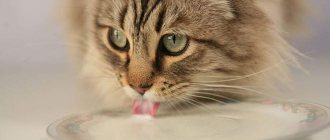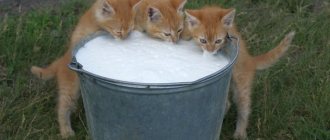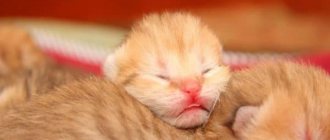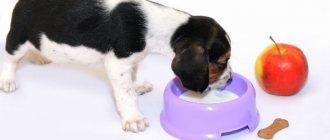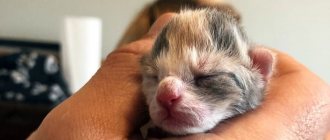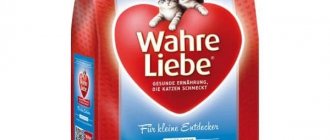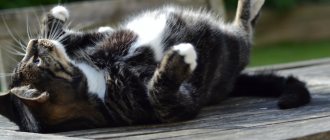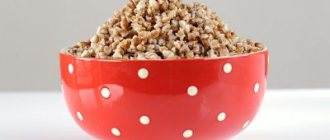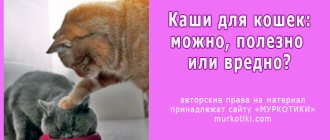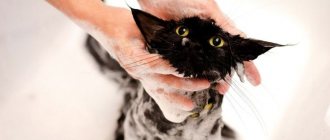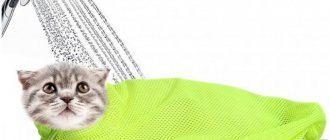Milk for kittens is a valuable, nutritious liquid that they receive from their mother. When the cat stops feeding the baby, he switches to solid food. The body reduces the production of the enzyme responsible for digesting milk. If you give your baby cow's milk instead of age-appropriate food, it may cause stomach upset.
Features of nutrition and digestion in kittens
Newborn kittens receive from mother's milk all the substances necessary for development. Cow and goat are not suitable because they do not contain the required amount of fat, protein, calories, and amino acids.
The milk that newborn kittens receive from their mother on the first day after birth not only transfers nutrients. The liquid contains antibodies that help babies fight viruses and bacteria that are dangerous specifically for cats.
A few days after birth, the amount of protein and fat in cat's milk increases. The latter contribute to the development of the nervous system of babies. Towards the end of feeding, the composition of the liquid changes, preparing the baby’s body for the transition to wet, then solid food of a carnivore.
Expert opinion
The opinions of experts on the issue of milk consumption by kittens and adult cats are ambiguous. On the one hand, milk is a rich source of vitamins, proteins, microelements and fats. On the other hand, excessive amounts of milk in your pet's diet can be harmful to health.
An excellent alternative to milk as an additive to a cat's diet is fermented milk products. It is important that it is natural, without sugar and various additives. Giving your cat fermented milk products is safe because they do not contain lactose. Products should have a small percentage of fat, but not low-fat. It is important that all fermented milk products fed to the cat are fresh.
It is not allowed to feed cats hard and salty cheeses, sweet fermented milk products. Sour cream, cream, cottage cheese or natural yogurt - these products are healthier and much safer for the cat.
Why cats can't have milk
Kittens grow very quickly and gain weight, so up to 12-16 weeks, food should be high-calorie and not contain components that disrupt the functioning of the digestive tract. First of all, this applies to cow and goat milk.
Lactose intolerance in cats
Dairy products contain lactose, a type of sugar that consists of glucose and galactose. It imparts sweetness to the liquid, which is an advantage of a milk drink for humans. But cats' taste buds do not respond to it.
Moreover, with age, the digestive system of pets reduces the synthesis of the lactase enzyme, which helps process lactose. Excess lactose is retained in the body, settles in the intestines and begins to interact with bacteria. Therefore, diarrhea and bloating in cats is the main sign of lactose intolerance.
Interesting fact: cat milk contains much less lactose than cow's and goat's milk - 3.4% versus 4.6%.
Milk in the diet of adult cats
Cats are carnivores, 70% of their diet should be meat, and dairy food cannot replace it. Some pets tolerate the product normally, without diarrhea or bloating. But due to the lack of necessary nutrients, there is no point in giving a milk drink to adult cats.
Replacing milk with fermented milk products
If the cat is a dairy lover and is on a natural diet, it is better to gradually replace this product with a fermented milk menu.
Kefir, fermented baked milk, natural yoghurts not only do not contain milk sugars, but are also enriched with lactic acid bacteria, which have a beneficial effect on digestion and the functioning of the entire gastrointestinal system of the cat as a whole.
There is no lactose in these products; it is what is converted into lactic acid during fermentation.
Using various types of fermented milk products, you can regulate and eliminate intestinal problems in your pet. So, for example, in case of regular constipation, fresh kefir will help, and in case of diarrhea, “old” (two-day old) kefir.
You can offer your cat milk without or with low lactose content, but usually such products do not delight your pet.
When choosing kefir, or better yet biokefir or fermented baked milk, you should pay attention to the fat content in them. It shouldn't be high. That is why you should not often offer your cat high-calorie cottage cheese or cheese, much less sour cream.
It is unacceptable to feed your pet sweet yoghurts and curds containing a lot of sucrose. Sugar is another harmful and dangerous human product for cats.
Can cats be given milk?
Do kittens get milk? Older babies who have switched to wet and solid food should not be given cow's or goat's milk. This usually happens by 8-10 weeks. Cats will not refuse dairy food, since the memory of the “taste of childhood” remains on the subconscious level.
Can kittens have cow's milk?
The maximum fat content of cat's milk is 10%, cow's milk is 3.6%. Can a small kitten be given cow's milk? No. It is unable to replace mother’s milk for a newborn, and is not needed for older pets. Moreover, the product cannot be given as the main food.
Cow's milk may not provide all the nutrients needed to keep your pet healthy. The fat present in the liquid contributes to weight gain and stomach upset in an adult cat. The low-fat product does not contain vitamins A and D, which help calcium and protein to be absorbed. This has a bad effect on the skeletal system.
Can kittens have goat milk?
Goat product contains more minerals and vitamins than cow product. It is fattier than cow's milk (6%), but this is not enough for a kitten. Goat milk has a little less lactose, so it is absorbed a little better than cow milk. However, once the kittens are on solid food, milk should be stopped.
The veterinarian can recommend a product for feeding a newborn kitten, giving a recipe for preparing the mixture. It is not recommended to give it in its pure form, since it does not contain many substances necessary for the normal development of the pet.
Can a kitten have milk from the store?
Is it possible to give a kitten store-bought milk? No. Mostly cow milk is sold in supermarkets and is not suitable for pets. Pasteurized products are especially harmful to cats. Studies have shown that it causes skeletal abnormalities, developmental defects and reproductive problems.
Moreover, do not buy cheap goods. Usually this is a low-quality product, where 2-3 tablespoons of dry powder are diluted with a liter of water, and there is not even a smell. A newborn will not benefit, and a grown pet will not need such food.
Can a kitten have powdered milk?
Pet stores sell dry food - cat milk substitutes. They can be given to kittens up to 8 weeks old if they are left without a mother or there is not enough milk. If there is no substitute on sale, the situation is critical; regular milk powder cannot be given. Call your veterinarian, who will tell you exactly how to prepare a formula for your newborn pet.
Are dairy products compatible with cat food?
Ready-made industrial cat food, both wet and dry, is already a fully balanced nutritional option and contains the entire range of substances necessary for a full life for pets. If a cat eats only specialized cat food, then it receives a sufficient amount of calcium, as well as all the necessary trace elements and vitamins.
The only supplement to cat food is water.
A mandatory addition to this diet is only clean, fresh water.
Feeding your mustachioed pet with ready-made food and dairy products is strictly contraindicated, since this is fraught with the development of liver diseases and the appearance of various hard deposits in the kidneys and bladder (urolithiasis).
What and how to feed a small kitten
If you picked up a kitten on the street or the cat does not have milk, the ideal option is to find a wet-nurse cat. To do this, ask your friends, advertise on social networks.
What kind of milk should be given to newborn kittens if a wet nurse has not been found? Buy kitten replacement from your veterinary pharmacy, which can be sold in liquid or dry form.
When a substitute is not sold in your city, ask your veterinarian how to prepare formula for feeding a kitten and what kind of milk to feed the kitten. You cannot feed your baby regular cow or goat milk; it must be mixed with yolk. Moreover, do not give condensed milk, the composition of which leaves much to be desired.
How to feed a newborn kitten
The pet must be fed from a special bottle with a nipple, which can be purchased at a pet pharmacy. If it is not there, you can take a pipette or syringe without a needle. In the second case, the mixture must be squeezed out slowly, otherwise the liquid may enter the trachea.
How much milk to give a kitten
A newborn kitten needs to be fed every 2 hours. You need to give:
- 2-3 ml of mixture per 1 feeding in the first three days of life;
- from days 4 to 7, the dose should be increased to 5 ml;
- at the age of 6-10 days – 5-7.5 ml.
Then the frequency of feedings decreases:
- from 11-14 days they give 10-12.5 mixtures, feeding every three hours.
- from 15-21 days – 10 ml of the mixture 8 times a day.
- from 21 days, give 7.5-25 ml 3-4 times a day, begin to introduce solid food.
Feeding instructions
- Dilute the mixture according to the instructions, heat in a water bath.
- Place a cloth on your knees, place the baby on his stomach, slightly raise his head.
- Give him a pacifier with a bottle.
- If you take the pacifier away prematurely, the baby will crawl and squeak. When he is full, he turns his face away and falls asleep.
- After feeding, remove any remaining food from the baby's fur.
- Place your pet on its back and stroke its tummy to start the process of digesting food.
- To avoid constipation and stimulate peristalsis, massage the kitten’s tummy and anus. If it doesn’t help, you can give an enema, but for the first time ask to do it yourself.
When do kittens need artificial feeding?
The ideal situation is as follows: the cat cares for and feeds the kitten until it is approximately 8 weeks old. Only then can you separate the baby from his mother. But there are times when human intervention and help is required. Reasons why this may happen include:
- death of a cat;
- lack or deficiency of milk in her;
- mastitis and inflammation of the uterus in a cat;
- eclampsia in a cat, that is, calcium deficiency;
- psycho-emotional deviations of the animal.
Sometimes the mother feeds the kittens regularly, but the babies still need complementary foods. This situation may arise if the litter is very large. It happens that a weak kitten is born, which quickly gets tired when sucking - in this case, it also needs additional nutrition. How you manage to feed a kitten without a cat or simply intervene a little in the process will determine its future health.
Question answer
Is it possible to give a one-month-old kitten milk from a non-cat?
There is no point if the mother has enough of it. If your baby is hungry, buy a formula designed for kittens.
Why can't cats be given milk?
The product contains lactose, which the cat's body does not digest well. The result of such feeding is diarrhea, bloating, allergies.
What kind of milk can you give a kitten?
If your baby has already switched to solid food, do not give him a milk drink.
Is it possible to feed a kitten milk?
No. If you have a newborn kitten without a mother, it is better to buy a cat milk replacer.
Should a nursing cat be given milk drinks?
No. It is better to give vitamins and minerals that veterinarians recommend for pregnant and lactating cats.
Conclusion
Naturally. That any owner himself selects food for his pet. But at the same time, you need to remember about the characteristics of the body of kittens and already grown cats.
Each baby’s body is individual, and in addition to general attitudes, one should take into account his reaction in a specific situation.
Expensive purebred cats are often intolerant not only to milk, but also to a large number of other foods, but outbred cats can eat everything and digest food perfectly without suffering from digestive problems.
Calculation of daily portions
In the natural environment, a cat does not control the amount of milk her kittens eat. But since the task is to feed a kitten without a cat, certain standards must be observed. The baby quickly gains weight, but his stomach volume is very small, so feeding should be dosed. The daily intake of the mixture depends on the age of the baby. Below is the amount calculated per 100 g of animal body weight:
- from birth to day 5 – 30 ml;
- from 6 to 14 days – 38 ml;
- from 15 to 24 days – 45 ml;
- from the 25th day and over the next month - 55 ml.
These are recommended figures and may vary slightly for each breed. The daily volume must be divided by the number of feedings. The most preferable option, as for humans, is in small portions, but more often.
Preparing a kitten feeding kit
To feed a kitten without a cat, you need to prepare everything you need, so that later it doesn’t turn out that something necessary is missing at that very moment.
First of all, you need to purchase auxiliary devices. You will need:
- plastic pipette;
- disposable syringe with a volume of 20 ml;
- catheter;
- pacifier;
- a small bottle with a narrowed spout (for children or intended for drinking kittens);
- measuring spoon;
- convenient bowl.
It is better to take several different pipettes and nipples at once, as some may not be suitable due to poor quality or may not withstand frequent washing. Syringes should also always be in stock.
If financial resources allow, you can simply purchase a ready-made kit for feeding animals: it includes a plastic bottle with a volume of 35 or 55 ml and a silicone nipple of a suitable size for one-week and two-week-old kittens.
